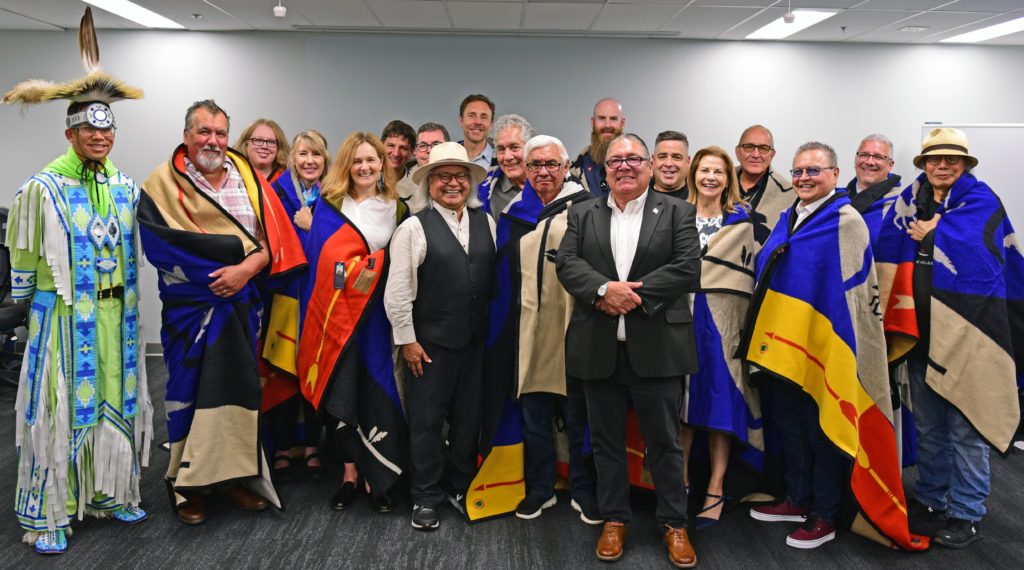In 2017, First Nations leaders from across the country formed a Development Board. Their mission? To guide the creation of an organization called the First Nations Infrastructure Institute (FNII). Why? To help First Nations and other Indigenous organizations develop their infrastructure projects in a faster, more cost-effective, and sustainable manner than the status quo.
Manny Jules, Chief Commissioner of the First Nations Tax Commission (FNTC), proposed creating FNII. In 2015 he described a vision for a new institution dedicated to offering support services tailored to the unique requirements of First Nations seeking a better approach to developing infrastructure.
The FNTC undertook initial research and prepared a draft concept plan and preliminary business case in 2016 and 2017. More research took place to detail the problems of the current Indigenous infrastructure system. As a result of this research and analysis, the FNTC formed the FNII Development Board. The board worked with interested First Nations to design a new institution to create a more innovative infrastructure system. This work culminated in the passage of Bill C-45 on June 20, 2023. The bill established FNII under the First Nations Fiscal Management Act (FMA), along with sister institutions the FNTC, the First Nations Financial Management Board, and the First Nations Finance Authority.
FNII Development Board members worked with a sense of urgency based on a shared understanding that high-quality public infrastructure is critical to the health and sustainability of communities, but that Indigenous infrastructure outcomes are very poor under the current approach.
On June 26, its members met in Ottawa for a blanketing ceremony to acknowledge and honour their role in this important work. At the event, Board members reflected on the work to get FNII off the ground and what they expect for the institute’s future. Here are some of their comments:
Allan Claxton, Development Board Chair, B.C. representative
“We have done the work to get to the starting line. We expect that FNII will support improved outcomes for Indigenous infrastructure projects, which means projects can be done more quickly, provide value for money, and last for their expected lifecycle.”
Celine Auclair, Quebec representative
“In my studies I learned that to be a government requires three things: (1) territory; (2) people; and (3) the ability to assert jurisdiction. The third one has been difficult to attain. Establishing FNII through the FMA will provide the room for Indigenous communities that choose to assert their jurisdiction.”
David Crate, Manitoba representative
“I decided to participate on the FNII Development Board because of things I have seen and encountered in my own community. Education and engagement will be a big piece of building capacity and assuming more control of our infrastructure.”
Dana Francis, Atlantic representative
“We know that we have to make sure that this works for those communities that want to work with FNII. A rising tide must lift all boats – that’s what I would like to see with all the communities that decide to work with FNII.”
Geordi Kakepetum*, Northern Ontario representative
“The work that is done here will help us to move away from dependency. We talk about self-determination – the work that is being done [at FNII] will help those communities that want to assume control of their infrastructure.”
*Sadly, Geordi Kakepetum died on Aug. 2. His colleagues at FNII mourn his passing and are grateful he was able to contribute to this work.
Keith Matthew, B.C. representative
“We have walked on this path a long time talking about the need to establish institutions to support our communities. We have developed some that are working well – the FNTC [First Nations Tax Commission], FNFA [First Nations Finance Authority] and FMB [First Nations Fiscal Management Board]. I am proud to establish another and to stand with all Development Board members in support of FNII.”
Joe Miskokomon, Southern Ontario representative
“This was done because of the logic – it makes sense. We from the communities fought for this. What we need to do now is address the question of capacity building. Engagement and education will be key and I look forward to the challenge.”

